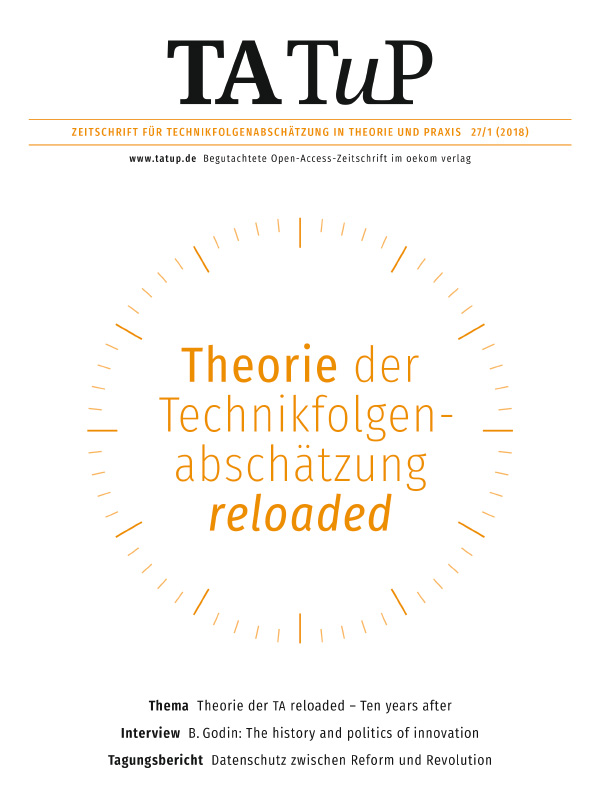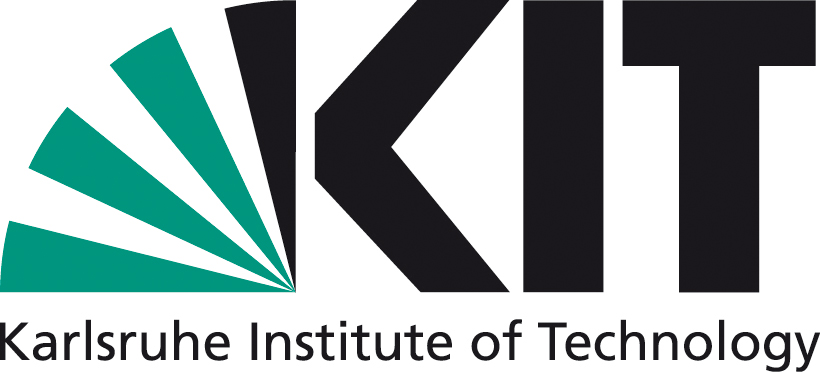TA as expertise for contextualization
Between a linear and a reflexive mode
DOI:
https://doi.org/10.14512/tatup.27.1.34Keywords:
theory of technology assessment, transformative science, technology governanceAbstract
Since the initial debate on a theory of TA ten years ago, time has not stood still: the quest for transformative science, for a new balancing of innovation systems and their governance as well as debates about the public-political form of expertise are contexts against which TA has to redefine its own position. The core dimensions of a theory of TA – assessing impacts, complying with scientific standards, and providing policy advice – have to be reassessed. Our thesis is that this necessitates conceptualizing TA between a linear and reflexive mode of contextualization.
References
Böschen, Stefan; Groß, Matthias; Krohn, Wolfgang (Hg.) (2017): Experimentelle Gesellschaft. Das Experiment als wissensgesellschaftliches Dispositiv. Baden-Baden: Nomos/sigma. DOI: https://doi.org/10.5771/9783845285450
Bogner, Alexander (2010): Partizipation als Laborexperiment. Paradoxien der Laiendeliberation in Technikfragen. In: Zeitschrift für Soziologie 39, S. 87–105. DOI: https://doi.org/10.1515/zfsoz-2010-0201
Bonß, Wolfgang; Hohlfeld, Rainer; Kollek, Regine (Hg.) (1993): Wissenschaft als Kontext. Kontexte der Wissenschaft. Hamburg: Junius.
Collins, Harry M.; Evans, Robert (2007): Rethinking expertise. Chicago: University of Chicago Press. DOI: https://doi.org/10.7208/chicago/9780226113623.001.0001
Finke, Peter (2014): Citizen Science. Das unterschätzte Wissen der Laien. München: oekom.
Gloede, Fritz (1992): Rationalisierung oder reflexive Verwissenschaftlichung? Zur Debatte um die Funktionen von Technikfolgen-Abschätzung für Technikpolitik. In: Thomas Petermann (Hg.): Technikfolgen-Abschätzung als Technikforschung und Politikberatung. Frankfurt a. M.: Campus, S. 299–328.
Gloede, Fritz (2007): Unfolgsame Folgen. Begründungen und Implikationen der Fokussierung auf Nebenfolgen bei TA. In: TATuP – Zeitschrift für Technikfolgenabschätzung in Theorie und Praxis 16 (1), S. 45–54. DOI: https://doi.org/10.14512/tatup.16.1.45
Grunwald, Armin (2007): Auf dem Weg zu einer Theorie der Technikfolgenabschätzung: der Einstieg. In: TATuP – Zeitschrift für Technikfolgenabschätzung in Theorie und Praxis 16 (1), S. 4–17. DOI: https://doi.org/10.14512/tatup.16.1.4
Grunwald, Armin (2010): Technikfolgenabschätzung. Eine Einführung. Berlin: sigma. DOI: https://doi.org/10.5771/9783845271057
Gudowsky, Niklas; Peissl, Walter (2016): Human centred science and technology. Transdisciplinary foresight and co-creation as tools for active needs-based innovation governance. In: European Journal of Futures Research 4 (8), 10 S. DOI: https://doi.org/10.1007/s40309-016-0090-4
Hennen, Leonhard (2012): Why do we still need participatory technology assessment? In: Poiesis und Praxis 9 (1–2), S. 27–41. DOI: https://doi.org/10.1007/s10202-012-0122-5
Howaldt, Jürgen; Schwarz, Michael (2010): Soziale Innovation. Konzepte, Forschungsfelder und -perspektiven. In: Jürgen Howaldt und Heike Jacobsen (Hg.): Soziale Innovation. Wiesbaden: VS Verlag für Sozialwissenschaften, S. 87–105. DOI: https://doi.org/10.1007/978-3-531-92469-4_5
Krings, Bettina-Johanna (2007): Business as Usual? Gesellschaftliche Rahmenbedingungen der Technikentwicklung in modernen Gesellschaften. In: TATuP – Zeitschrift für Technikfolgenabschätzung in Theorie und Praxis 16 (1), S. 18–25. DOI: https://doi.org/10.14512/tatup.16.1.18
Kuhlmann, Stefan (2013): Strategische und konstruktive Technikfolgenabschätzung. In: Georg Simonis (Hg.): Konzepte und Verfahren der Technikfolgenabschätzung. Wiesbaden: Springer, S. 129–143. DOI: https://doi.org/10.1007/978-3-658-02035-4_8
Leggewie, Claus (2007): Von der Politik- zur Gesellschaftsberatung. Neue Wege öffentlicher Konsultation. Frankfurt a. M.: Campus.
Meyer-Soylu, Sarah; Parodi, Oliver; Trenks, Helena; Seebacher, Andreas (2016): Das Reallabor als Partizipationskontinuum. Erfahrungen aus dem Quartier Zukunft und Reallabor 131 in Karlsruhe. In: TATuP – Zeitschrift für Technikfolgenabschätzung in Theorie und Praxis 25 (3), S. 31–40. DOI: https://doi.org/10.14512/tatup.25.3.31
Paschen, Herbert; Gresser, Klaus; Conrad, Felix (1978): Technology Assessment, Technologiefolgenabschätzung. Ziele, methodische und organisatorische Probleme, Anwendungen. Frankfurt a. M.: Campus.
Pielke, Roger A. (2007): The honest broker. Making sense of science in policy and politics. Cambridge: University Press. DOI: https://doi.org/10.1017/CBO9780511818110
Rip, Arie (2014): The past and future of RRI. In: Life Sciences, Society and Policy 10 (17). DOI: https://doi.org/10.1186/s40504-014-0017-4
Schneider, Christoph; Andreas Lösch (2015): What about your futures, technology assessment? An essay on how to take the visions of TA seriously, motivated by the PACITA conference. In: TATuP – Zeitschrift für Technikfolgenabschätzung in Theorie und Praxis 24 (2), S. 70–74. DOI: https://doi.org/10.14512/tatup.24.2.70
Schneidewind, Uwe; Singer-Brodowski, Mandy (2014). Transformative Wissenschaft. Klimawandel im deutschen Hochschulsystem. Marburg: Metropolis.
Schomberg, René von (2013): A vision of Responsible Research and Innovation. In: Richard Owen, John Bessant und Maggy Heintz (Hg.): Responsible innovation. Managing the responsible emergence of science and innovation in society. London: John Wiley & Sons, S. 51–74. DOI: https://doi.org/10.1002/9781118551424.ch3
Schot, Johan; Rip, Arie (1997): The past and future of constructive technology assessment. In: Technological Forecasting and Social Change 54 (2–3), S. 251–268. DOI: https://doi.org/10.1016/S0040-1625(96)00180-1
Steinbach, Armin (2017): Meinungsfreiheit im postfaktischen Umfeld. In: Juristenzeitung 72 (13), S. 653–661. DOI: https://doi.org/10.1628/002268817X14961562927626
Stilgoe, Jack; Owen, Richard; Macnaghten, Phil (2013): Developing a framework for responsible innovation. In: Research Policy 42 (9), S. 1568–1580. DOI: https://doi.org/10.1016/j.respol.2013.05.008
Strassheim, Holger; Kettunen, Pekka (2014): When does evidence-based policy turn into policy-based evidence? Configurations, contexts and mechanisms. In: Evidence & Policy 10 (2), S. 259–277. DOI: https://doi.org/10.1332/174426514X13990433991320
Strohschneider, Peter (2014): Zur Politik der Transformativen Wissenschaft. In: André Brodocz, Dietrich Herrmann, Rainer Schmidt, Daniel Schulz und Julia Schulze Wessel (Hg.): Die Verfassung des Politischen. Wiesbaden: Springer Fachmedien, S. 175–192. DOI: https://doi.org/10.1007/978-3-658-04784-9_10
Swyngedouw, Erik (2010): Apocalypse forever? Post-political populism and the spectre of climate change. In: Theory, Culture & Society 27 (2–3), S. 213–232. DOI: https://doi.org/10.1177/0263276409358728
van Lente, Harro; Swierstra, Tsjalling; Joly, Pierre-Benoît (2017): Responsible innovation as a critique of technology assessment. In: Journal of Responsible Innovation 4 (2), S. 254–261. DOI: https://doi.org/10.1080/23299460.2017.1326261
van Oudheusden, Michiel (2014): Where are the politics in responsible innovation? European governance, technology assessments, and beyond. In: Journal of Responsible Innovation 1 (1), S. 67–86. DOI: https://doi.org/10.1080/23299460.2014.882097
WR – Wissenschaftsrat (2015): Zum wissenschaftspolitischen Diskurs über große gesellschaftliche Herausforderungen. Positionspapier, Drucksache 4594-15, Stuttgart. Online verfügbar unter https://www.wissenschaftsrat.de/download/archiv/4594-15.pdf, zuletzt geprüft am 09. 02. 2018.
Zürn, Michael (2012): Autorität und Legitimation in der postnationalen Konstellation. In: Leviathan 40 (27), S. 41–62. DOI: https://doi.org/10.5771/9783845245072-41
Downloads
Published
How to Cite
Issue
Section
License
Copyright (c) 2018 Stefan Böschen, Ulrich Dewald

This work is licensed under a Creative Commons Attribution 4.0 International License.








